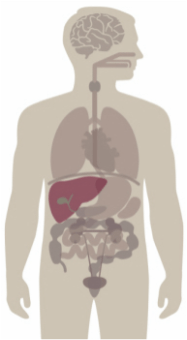Liver, Pancreas and Small Intestine
General Symptoms
Most individuals with problems in the liver, pancreas or small intestine have either no symptoms or symptoms that are hard to identify as relating to a specific area of the body. You can get what you think is the flu or think you have recurrent food poisoning or nose-bleeds and then find out you are having issues with your liver, pancreas, or small intestine.
Often, the only way to diagnose these problems is with a blood test.

Gallbladder / Gallstones
One of the ways the liver converts food to energy is by producing bile. Your body uses bile to digest fat. In order for bile to be available when your body needs it, it is stored in the gallbladder. Bile travels through the bile ducts to your small intestine.
Gallstones are essentially hardened bile which can block the bile ducts. Scar tissue and infections can also block the bile ducts.
Symptoms of a blocked bile duct include nausea, vomiting and abdominal or back pain and occasionally jaundice.
Ignoring problems with your gallbladder and bile ducts can lead to bigger problems with your liver later on.
Pancreas
The pancreas, a small organ behind the stomach, secretes chemicals to digest food as well as insulin and glucagon which are control blood sugar levels.
Alcoholism, injury and high cholesterol and even gallstones can all cause inflammation of the pancreas. If the pancreas becomes inflamed, it can scar and eventually fail to function.
Swelling of the pancreas is called pancreatitis and symptoms include abdominal pain, indigestion, vomiting, jaundice, fever, sweating, gas and hiccups.
A single bout of pancreatitis can go away on its own in about a week but some cases require hospitalization and recurrent cases can be life-threatening.
Liver
Hepatitis is an inflammation of the liver. This inflammation is caused by a virus -- typically type B or C -- which is why it is referred to as Hepatitis B or Hepatitis C. Symptoms for either include fatigue, fever, nausea, joint pain, loss of appetite and yellowing of the skin and eyes (jaundice). and with the exception of jaundice these symptoms, which fade after a few weeks, easily can be mistaken for the flu.
Scarring of the liver is known as cirrhosis and can occur from an injury or an illness including hepatitis, chronic alcoholism or from obesity or a hereditary disorder. The liver fights infection, converts food into energy and filters the blood. When it is damaged the liver becomes less and less able to function. Dark urine, bruising, bleeding and nose bleeds are some of the symptoms that are noticeable. Scar tissue won't heal but treatment can prevent cirrhosis from progressing.
Dark urine can be caused by dehydration and some medications. If, however, your urine is brown or red and you aren't taking any medicine that you've been told will change your urine's color, you should contact a doctor immediately.
Jaundice (yellowing of the skin and eyes) is almost exclusively related to liver disorders and should also signal a need to see your doctor immediately.
Small Intestine
Celiac disease is a disorder in which your body reacts to gluten. Damage to the small intestine can lead to poor absorption of any nutrients (not just gluten). Some people will show no symptoms while others will feel tired, depressed or moody. Celiac symptoms can include cramping, bloating, diarrhea, or even seizures. It is easy to see why it might be hard to identify celiac disease or the small intestine as the problem. Related to celiac disease, is gluten-intolerance. Gluten-intolerance is a matter of degree as to how well your body can digest gluten.
Health Tips
- Keep up to date on your vaccinations especially if you are in health care or traveling. There are vaccines for Hep A & B.
- Avoid exposure -- illegal drugs, unprotected sex and even tattoos and body piercing can put you at a higher risk.
- Abstain from alcohol or limit your intake.
- Eat a healthy diet and maintain a healthy weight.
- Pay attention to your medications... acetaminophen (Tylenol) or medications containing acetaminophen, when taken too often or above the recommended dose, can cause liver damage.
